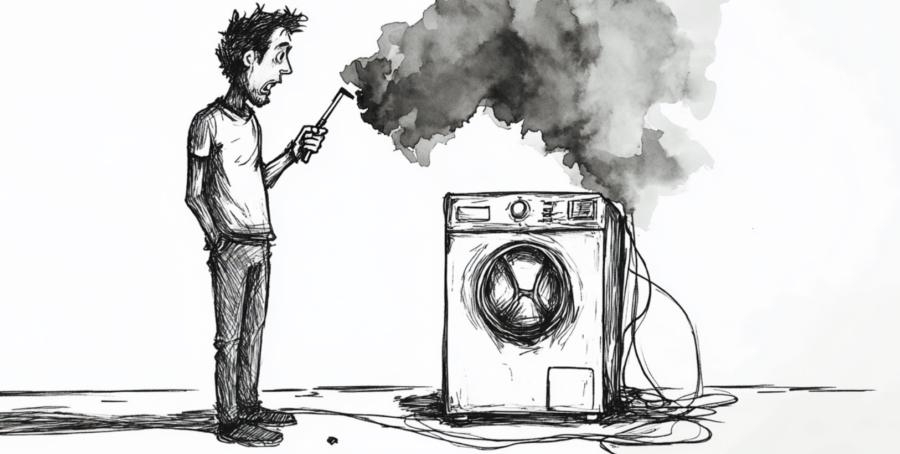DIY Appliance Repair Blunders That Could Fry More Than Just Your Toaster

When a Screwdriver Becomes a Lightning Rod
Fixing things yourself is a noble pursuit. It’s the modern equivalent of slaying a dragon, except the dragon is a leaky dishwasher, and instead of a sword, you're wielding a mismatched set of Allen wrenches. But what if that dragon turns around and bites?
One of the biggest risks of DIY appliance repair is electrocution. Modern appliances aren’t just simple machines—they're high-voltage puzzles designed by engineers who clearly enjoy a challenge. A simple mistake, like forgetting to unplug your fridge before poking around its innards, can turn a routine fix into an unplanned science experiment, where you’re the test subject.
Even if you manage to avoid a full-blown shock, improper wiring can create sneaky electrical hazards. Loose connections and amateur repairs can lead to short circuits, and a short circuit doesn’t just mean a broken appliance—it means a potential fire risk. So if you think you're just fixing a small issue, remember that you might also be installing a future smoke detector activation event.
Warranty? What Warranty?
That warranty you skimmed over when you bought your washing machine? It’s not just decorative fine print. Manufacturers include specific repair clauses for a reason—because they know that the average person should not be elbow-deep in a dryer drum without proper training.
One wrong move with a DIY repair, and poof—your warranty is gone faster than a sock in the laundry vortex. This means when something major actually goes wrong, you’ll be footing the entire repair bill. Ironically, what started as an attempt to save money can end up costing more than simply hiring a professional in the first place.
The “Oh No” Factor of Gas Appliances
Gas stoves, ovens, and water heaters come with an additional level of risk: the kind that goes *boom*. A misaligned gas connection or an improperly sealed valve isn’t just an inconvenience—it’s an accident waiting to happen.
Even if you’re sure you’ve tightened everything properly, a small leak can build up over time. Gas is sneaky like that. The real kicker? You might not notice it until a spark—say, from flipping a light switch—turns your kitchen into an action movie explosion scene.
Professional appliance technicians use specialized tools to detect leaks and ensure safe installation. Your method of “sniffing around and hoping for the best” is slightly less reliable.
The Fire Risk You Didn’t See Coming
Some household fires start in the most unexpected ways—like a dryer vent clogged up because someone (not naming names) figured “cleaning it once a year is probably fine.” Dryers are responsible for thousands of home fires annually, often due to lint buildup.
But it’s not just dryers. Fridges, microwaves, and even dishwashers have electrical components that can overheat if not properly repaired. Botched wiring, using incorrect parts, or failing to reassemble components correctly can lead to overheating and, eventually, flames.
Consider this: if your DIY repair involves duct tape and a hopeful attitude, you’re not fixing the problem—you’re postponing disaster. And that disaster might just show up at 3 AM, when you’re least prepared to deal with an impromptu kitchen bonfire.
Parts Unknown: The Case of the Mystery Screws
Every DIYer has experienced it: you take apart an appliance, perform your so-called “fix,” and upon reassembly, you’re left with an extra screw—or worse, several. Where did they come from? Are they important? The appliance still works (for now), so maybe they were optional?
Here’s the thing: manufacturers don’t toss in spare screws for fun. Each one has a purpose, whether it’s keeping crucial components secure or ensuring proper weight distribution. Those seemingly “extra” parts could mean your appliance is now operating at 75% stability, and that remaining 25% is just waiting for the worst possible moment to collapse.
When you hire a professional, they not only put everything back correctly, but they also don’t have to Google “what does this springy thing do?” in the middle of a repair.
Some Jobs Are Best Left to the Pros
There’s a difference between tightening a loose refrigerator door handle and rewiring an entire oven. One is a harmless afternoon project, the other is a potential call to emergency services.
If the repair involves electricity, gas, complex electronics, or parts that sound expensive when you break them, it’s probably best to call a technician. Appliance repair specialists don’t just fix problems—they prevent new ones from forming.
Shock, Flames, and Broken Dreams
DIY repair can be tempting, especially when you’re staring at an appliance that just stopped working right before a dinner party. But before diving in with a screwdriver and a YouTube tutorial, consider what’s at stake: your safety, your home, and possibly the integrity of your eyebrows.
Sometimes, spending a little now on a professional repair saves a lot in the long run. Because while a technician’s bill might sting, it’s still cheaper than replacing a burnt-down kitchen.
|
|

